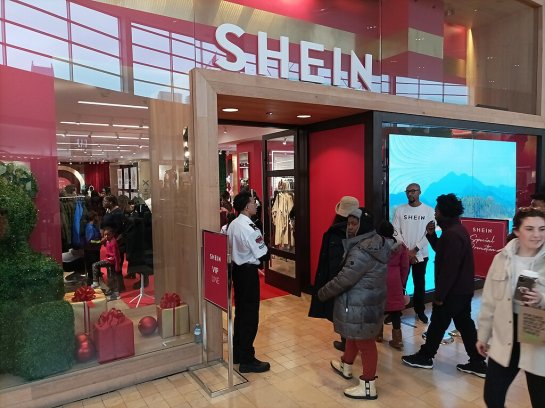
Dealing with deadstock at Shein
Ultra-fast fashion leader’s next move has major market implications.

22nd May 2024
Innovation in Textiles
|
London
Fast-fashion giant Shein, founded in China in 2012 but based in Singapore since 2021, is currently deciding whether to launch an initial public offering (IPO) on the London Stock Exchange (LSE) or on Wall Street.
An initial public offering in London could value the company at around £50-60 billion, even as neighbouring France is planning a bill to crack down on fast fashion and impose penalties on low-cost clothing to cover environmental impact, specifically targeting Shein.
FTSE boost
E-commerce fulfilment expert Parcelhero observes that while rivals struggle, Shein is bucking the trend in fast fashion by continuing to register significant profits. A successful London IPO would boost the FTSE 100 but could ultimately spell the demise of Asos and Boohoo.
“The potential LSE float is far from being a mere second choice in the event that the US authorities don’t give the go-ahead to a New York IPO,” says Parcelhero’s head of consumer research David Jinks. “Shein’s executive chairman Donald Tang met with UK chancellor Jeremy Hunt earlier this year and representatives are reportedly in talks with one of his predecessors, Sajid Javid, about becoming a board member or adviser.”
Last year, Shein reportedly sold $45 billion of clothing for a $2 billion profit. This in marked contrast to its two LSE-listed fast-fashion competitors.
In April, Asos revealed its losses had widened to $152 million in its half year to March 3rd. Similarly, fellow e-commerce fashion site Boohoo reported this month that its statutory pre-tax losses widened by 69.2% to $199.7 million for the 12 months to the end of February, on revenues of $1.86 billion.
Market volatility
“Post-Covid, the e-commerce clothing market has been volatile and it’s not just UK-based fast-fashion e-tailers that are struggling,” says Jinks. “Even Amazon recently ditched all but three of its own-label clothing brands to adapt to the changing market. Heavily pushed labels such as Goodthreads, Wag and Mama Bear were binned, with only Amazon’s Essential, Collection and Aware brands left.
“The reason Shein is thriving in the midst of all these fashion victims is also perhaps the reason why it might end up on the London rather than Wall Street stock exchange. While ASOS and Boohoo are fast fashion companies, Shein represents a new breed of ultra-fast fashion brands.”
Shein uses algorithms to track customer interest. It can produce new items rapidly thanks to the many garment and textile makers it uses in China's Pearl River Delta, the area around the cities of Dongguan, Guangzhou and Shenzhen.
These workshops mean Shein can immediately order more if an item starts to sell well. This is in contrast to the traditional model, which is to place large advance orders and hope for the best. Even companies such as Asos have recently found themselves with excessive amounts of unsold stock.
Underpaid labour
While Shein argues its responsive supply chain limits waste, Shein has come under heavy criticism for utilising underpaid labour in its supplier factories and violating human rights.
“That’s a concerning accusation for Shein,” says Jinks. “Fast-fashion brands are keenly aware of potential consumer backlash. Boohoo, for example, even faced significant criticism for its UK sourcing, with the workshops around Leicester that supplied it being accused of low pay and poor working conditions.
“While these accusations may be of concern to the US financial authorities and UK and US investors, there are also wider claims against Shein. It is also being accused by some members of US Congress of alleged links to the Xinjiang Uyghur Autonomous Region of China which has been the subject of forced labour claims for some time. Shein strongly denies these accusations, which come amid increasing anti-China sentiment from US businesses and Government.”
Smoother ride
Coming on top of the US Government’s demand that TikTok must be sold by its China-based owners or risk being banned, London looks to be a smoother ride for Shein, Jinks adds.
“Currently ASOS is listed in the FTSE Small Cap Index and Bohoo is an FTSE 100-listed company. There is speculation that Shein could be seeking a £71 billion valuation, which would make it one of the top ten largest businesses in the FTSE 100. That poses the question: will UK investors feel it has significantly more to offer than ASOS and Boohoo? Ironically, these were once the market disruptors Shein now represents, but have become part of the established market. The answer to this question could have a big impact on how UK retail develops.
“As retail settles to a new equilibrium, it will be those retailers with strong in-store and online sales that will ultimately triumph in a post-Covid world,” Jinks concludes.
Parcelhero’s influential report 2030: Death of the High Street has been discussed in the UK Parliament. It reveals that unless retailers develop an omnichannel approach, embracing both online and physical store sales, the High Street as we know it will reach a dead-end by 2030.

Business intelligence for the fibre, textiles and apparel industries: technologies, innovations, markets, investments, trade policy, sourcing, strategy...
Find out more